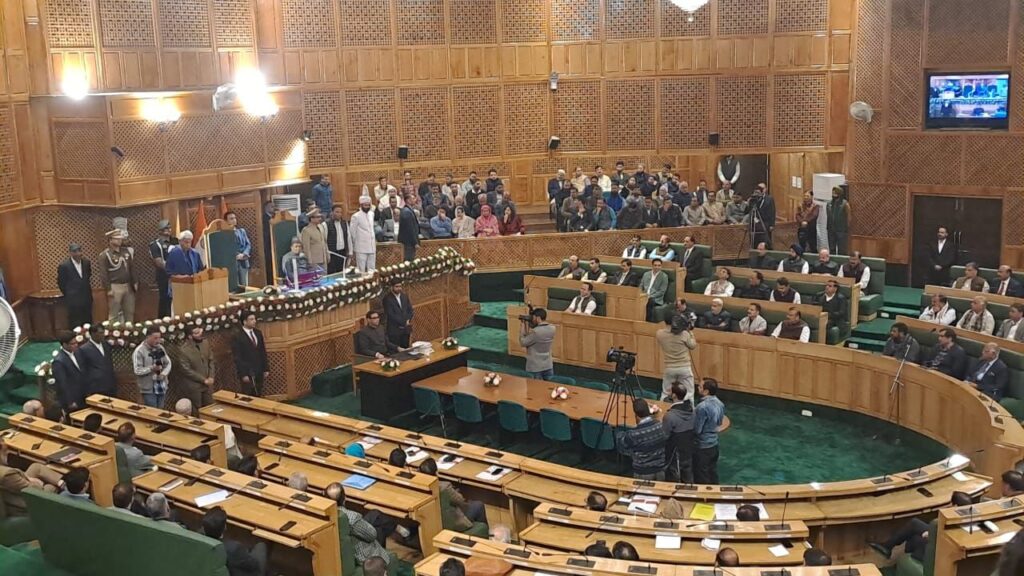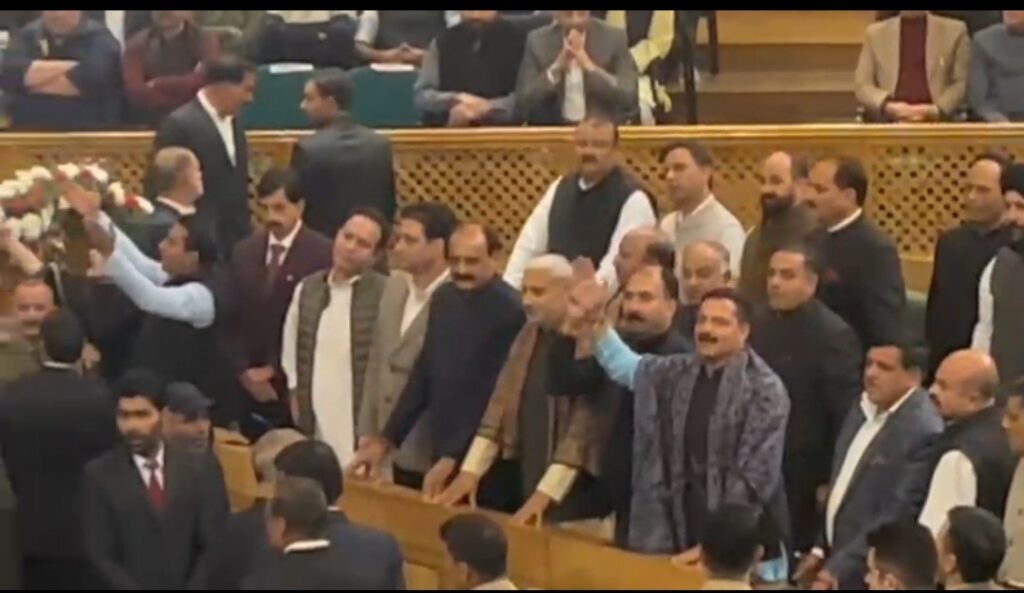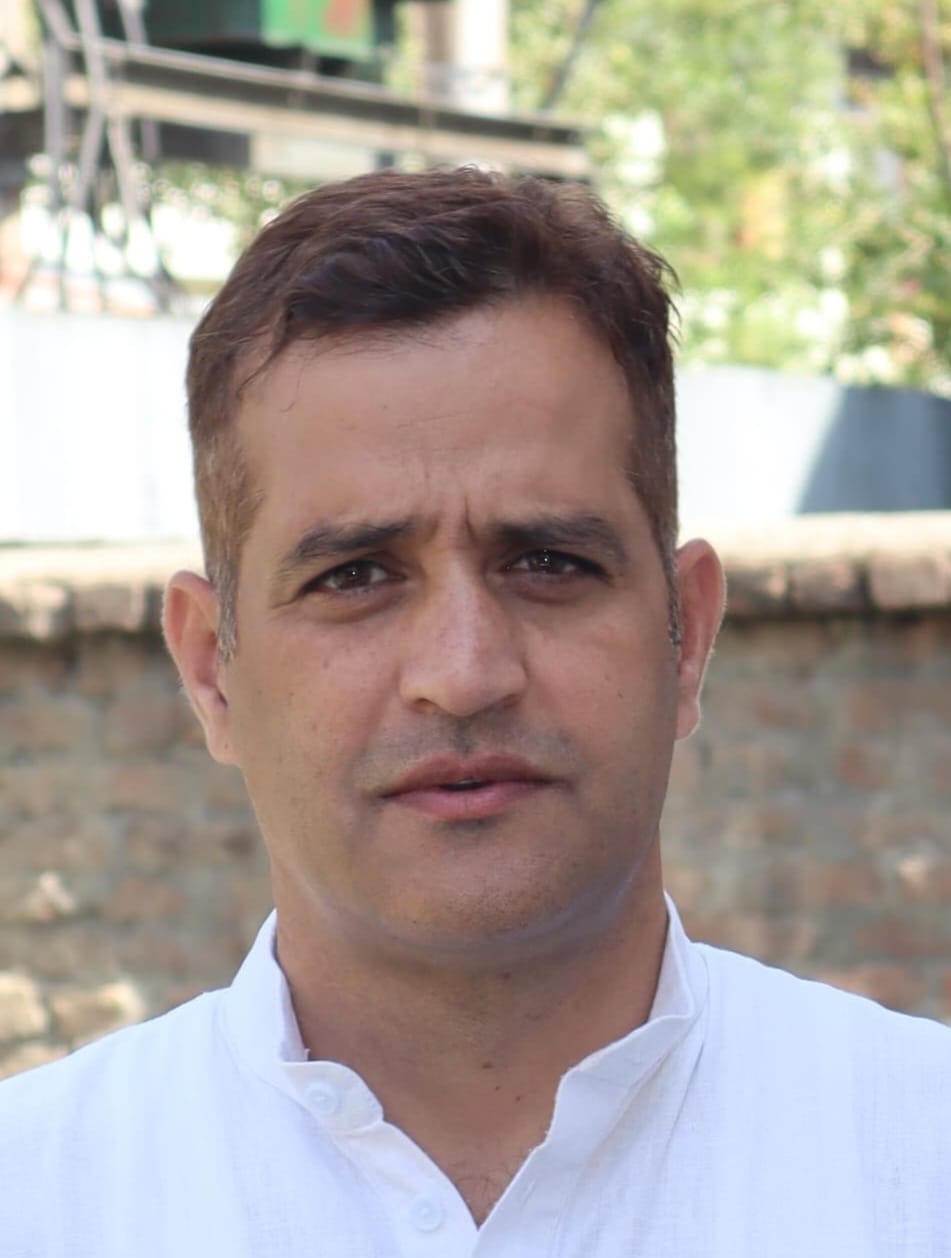Mir Iqbal
India is a democratic country with a quasi-federal system, blending features of both federal and unitary systems. This unique structure allows for a central parliament to make laws for the entire nation, while state and union territory assemblies have lawmaking powers within their respective domains.In this context, the Jammu and Kashmir assembly’s role is vital in addressing regional concerns and making laws that cater to the specific needs of its people. Elected representatives must recognize the significance of every assembly session, ensuring productive discussions and decision-making.The recent Jammu and Kashmir assembly session, held from November 4 to 9, 2024, was historic as it marked the first session since the abrogation of Article 370 and 35A. Unfortunately, the session drew attention for all the wrong reasons – disruptions marred the proceedings from the Lieutenant Governor’s address to the vote of thanks. The way these disruptions were encouraged and celebrated on social media may set a worrying precedent for future assembly sessions.In fact, the 2024 Jammu and Kashmir Legislative Assembly election was the first in over a decade, and the first since the territory’s special status was revoked . The Indian National Developmental Inclusive Alliance, comprising the Jammu and Kashmir National Conference, Indian National Congress, and Communist Party of India (Marxist), won a majority of seats in the election. However, the disruptions in the assembly session raise concerns about the ability of the elected representatives to focus on governance and development.It’s crucial for the people of Jammu and Kashmir and their elected representatives to recognize the significance of productive assembly sessions. Disruptions and dangal may provide temporary entertainment, but they undermine the democratic process and hinder progress. Instead, the focus should be on meaningful discussions, debates, and decision-making that benefit the state and its people.

People must recognize that disruptions in the Jammu and Kashmir assembly session are detrimental to the interests of its citizens. Instead, these disruptions provide a convenient excuse for both the ruling and opposition parties to shirk their responsibilities. Both sides can exploit these disruptions to gain political mileage outside the assembly, which is concerning.In fact, such disruptions often seem orchestrated to deceive voters. It’s crucial for the public to understand that their elected representatives are accountable for productive governance, not creating chaos. By holding them accountable, citizens can ensure that the assembly functions efficiently and addresses pressing regional issues.This is particularly important in Jammu and Kashmir, considering the significant changes the region has undergone since the abrogation of Article 370 and 35A.

The recent assembly elections, which saw the National Conference and Congress alliance win a majority, offer a fresh start However, disruptions in the assembly can hinder progress and undermine the democratic process.Citizens must demand constructive debate and meaningful discussions from their elected representatives, rather than tolerating disruptions that serve only to further political agendas. By doing so, Jammu and Kashmir can move forward and address its challenges effectively.Since 2014, there has been a deliberate effort to intellectually degrade our society by promoting nonsensical content on social media, which unfortunately gained widespread acceptance. As a result, our younger generation has become more drawn to such content than intellectual and informative material online. Sadly, even our media contributes to this issue by promoting sensationalized content solely for viewership.This phenomenon is part of a larger trend where people knowingly share false or misleading information online, often driven by factors like a desire for attention, support for extremist views, or a psychological need for chaos The consequences are concerning, as exposure to misinformation can lead to false beliefs, conspiracy theories, and harmful behaviors.To address this issue, it’s essential to promote critical thinking, media literacy, and responsible social media practices. By encouraging open communication and education, we can empower our younger generation to discern between intellectual and nonsensical content online Our society in Kashmir has unfortunately fallen prey to the pitfalls of social media, where our young generation is more focused on gaining attention through nonsensical content rather than exploring meaningful pursuits like innovation, comparative studies, and entrepreneurship. This is particularly concerning when we consider the immense potential of our youth and the opportunities available to them.To truly transform our society, we must encourage our young generation to explore these opportunities and strive for excellence. By doing so, we can create a brighter future for ourselves and for generations to come.I share my concern about the recent Jammu and Kashmir legislative assembly session, which was marred by disruptions, unbecoming gestures, and self-promotion by elected representatives. This behavior may lead to an absurd future and irrelevant assembly, failing to address the people’s miseries that prompted their election ¹.The disturbing trend of glorifying disruptions on social media is equally troubling. People are praising these MLAs with titles like “tiger,” “lion,” or “dabang,” which they proudly wear as badges of honor. Instead of celebrating such antics, the public should be demanding accountability and tangible achievements from their elected representatives.It’s crucial for citizens to recognize that their elected representatives are accountable for productive governance, not creating chaos. By holding them accountable, citizens can ensure that the assembly functions efficiently and addresses pressing regional issues.The recent assembly elections in Jammu and Kashmir, which saw the National Conference and Congress alliance win a majority, offer a fresh start. However, disruptions in the assembly can hinder progress and undermine the democratic process.To truly transform our society, we must encourage our young generation to explore meaningful pursuits like innovation, comparative studies, and entrepreneurship, rather than glorifying nonsensical content on social media. By doing so, we can create a brighter future for ourselves and for generations to come.Our elected representatives, or Members of the Legislative Assembly (MLAs), are paid with taxpayer money to perform specific duties. These duties include making laws, debating bills and motions, examining issues, and ensuring the efficient functioning of the assembly. Unfortunately, the recent assembly session in Jammu and Kashmir was marred by disruptions and unproductive antics, which is not what taxpayers are paying for ¹.To hold MLAs accountable, it’s crucial for the media and public to play an active role. The media can organize public assemblies and debates to discuss the role of MLAs in the assembly session. Meanwhile, the public should refrain from encouraging disruptive behavior and instead ask their MLAs about their achievements and roles in their respective constituencies.
Key Responsibilities of MLAs:– Lawmaking: Creating laws that benefit the state and its citizens- Financial Oversight: Approving expenses from the State Treasury and authorizing grants and tax-raising proposals- Executive Accountability: Holding the Chief Minister and Council of Ministers accountable for their actions- Electoral Powers: Electing the President of India, members of the Rajya Sabha, and the Speaker and Deputy Speaker of the Legislative Assembly.By understanding the roles and responsibilities of MLAs, citizens can demand more from their elected representatives and ensure that they’re working towards the state’s progress.
Mir Iqbal is young Congress leader in Baramaulla.He is former chairman Block Development Council Narvaw.

